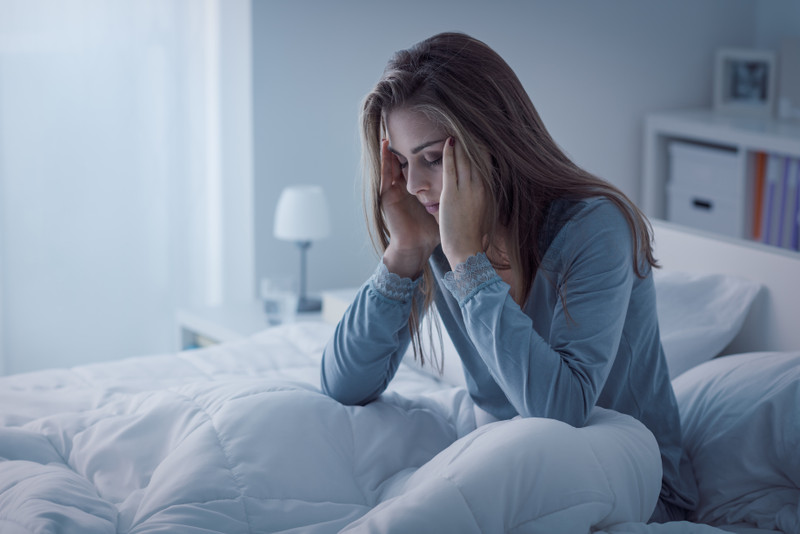An occasional sleepless night can wreak havoc on a person’s lifestyle for several days at a time, as can a period of two or three weeks of interrupted, restless sleeps that leaves you drowsy and out of sorts day and night as you deal with worry, anxiety, and/or bouts of depression. But there’s even a worse type of insomnia, the type that can linger on for months.
Chronic insomnia is defined as a lack of sleep that persists for three months or more, along the way draining a person’s energy while negatively affecting mood. It can also be a major factor leading to an array of serious health issues ranging from cardiovascular diseases and chronic pain syndrome to diabetes, obesity, and asthma.
The symptoms of chronic insomnia themselves can be miserable to deal with, ranging from tiredness and sleepiness during the day and consistent bouts of crankiness and anxiety to problems paying attention or focusing, which is particularly problematical when operating machinery or driving a car.
What Age Group Is at Highest Risk of Chronic Insomnia?
As of 2024, one in eight Americans have reportedly been diagnosed with chronic insomnia. The demographic found to be most likely to be so diagnosed are those between the ages of 25 and 34, at 16 percent. The highest rate of chronic insomnia by geographical breakdown live in the America West, at 14 percent, the lowest being in the Midwest at 10 percent.
The incidence of insomnia becomes more common as people age, and the causes for it are varied. They can include stress from any one of numerous sources, such as recent death of a loved one, problems in the workplace, squeezed finances; poor sleep habits such as watching TV in bed; excessive eating well after typical dinnertime; the effects of prescription drugs on your body; and mental health issues.
5 Natural Remedies to Help Mitigate Chronic Insomnia
Following are five herbs or supplements that have been known to help alleviate chronic insomnia issues. Be sure to discuss use of any of these products with your physician or other healthcare professional. Hopefully, you won’t be counting sheep for long:
Melatonin. This is often No. 1 on the list of recommended natural remedies for insomnia. This is the same chemical your brain releases at night to make you sleepy and fall asleep in a reasonable amount of time. Supplementing your brains’ dispatch of melatonin can only help, as long as you abide by the directions for usage and amount.
5-HTP. Short for 5-hydroxytryptophan, this serotonin-like compound is converted by your body into melatonin, thus aiding you when you need help falling asleep and staying asleep.
Valerian. Here’s the first thing to know about this medicinal-type herb that might make it the best fit for chronic insomniacs – it usually takes a few weeks for it to start working, making it a suitable choice for the long haul and its long-term administration. Valerian is believed to bolster GABA (gamma-aminobutyric acid, an inhibitory neurotransmitter) levels in the brain, thus producing a calming effect. It does this by blocking certain disruptive signals emanating form your central nervous system.
St. John’s Wort. First off, ingestion of this herbal treatment, which has been in use in traditional medical practices more than 2,000 years, won’t cause warts. It’s not even spelled the same. It is most commonly used to help treat depression, which is a condition known to contribute to chronic insomnia. Multiple studies have demonstrated St. John’s Wort to be as effective as prescribed antidepressants such as TCAs and SSRIsfor treating persons with mild to moderate depression. Be sure, though, to discuss its use with a healthcare professional as it can interact with prescribed medications already at work in the body.
Ashwagandha. This is yet another medicinal herb that has been used in medical practices dating back centuries – in this case Ayurvedic medicine (traditional Indian healing). Similar to how some types of ginseng work, ashwagandha has been shown to reduce elevated cortisol levels, referring to the “stress hormone” that is released when your body experiences stress, such as in the fight or flight response.
Once a person’s persistent case of insomnia reaches three months, that’s when it becomes known as “chronic insomnia.” At that point, a consultation with a physician or other healthcare professional – if it hasn’t already been done – is highly recommended. Such discussion would be well served by touching on the topics of natural remedies such as herbs and supplements before jumping into writing out prescriptions.

